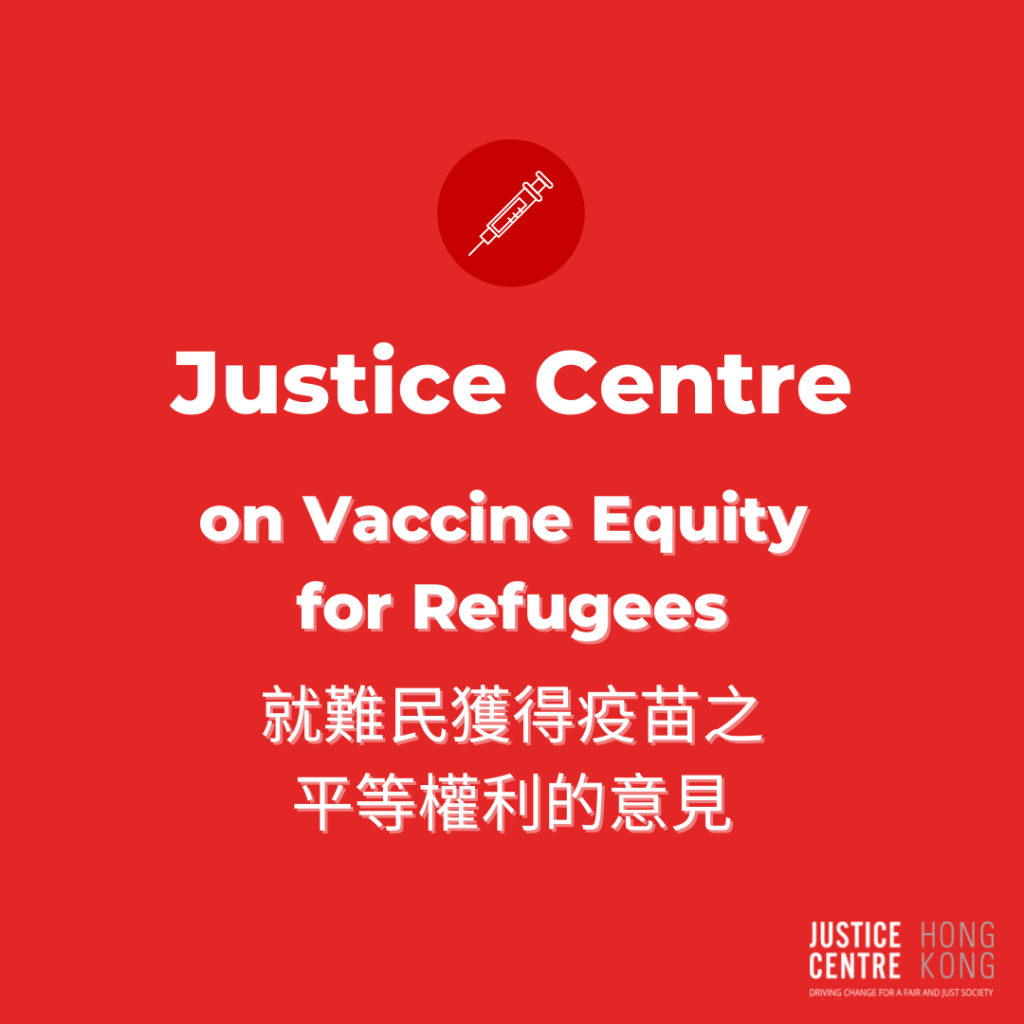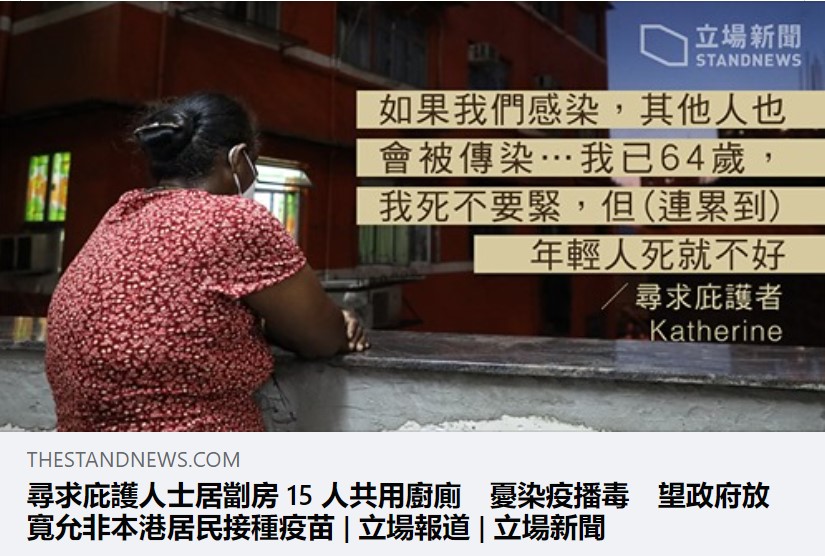In response to media enquiries, Justice Centre Hong Kong provides the following comments:
Everyone’s health and wellbeing is interconnected in a pandemic. This is why for Hong Kong’s public health response to be effective, it is crucial that everyone in our society – including refugees and asylum seekers – are included in the overall public health response, including equal access to COVID-19 vaccines. Championing this, Justice Centre together with a group of NGOs published a list of emergency policy recommendations early in the pandemic in April 2020.
Refugees and asylum seekers have been largely left out of Hong Kong’s public health response. In the early weeks of the pandemic, this community was not provided with hygiene products, such as masks and sanitisers. There was no information on how this community could access healthcare services if they developed symptoms, or whether they could access community testing centres. To date, refugees and asylum seekers are not eligible for the covid-19 vaccine, as they do not have any legal immigration status. The Government’s exclusion of the refugee community from Hong Kong’s public health response further exacerbated barriers already faced by refugees and asylum seekers in accessing healthcare services.
Further, asylum seekers are required to report regularly to the Immigration Department in person. The need to travel – often considerable distances and on public transport – for the purposes of reporting puts people at risk and is against the public health advice to stay at home and practice social distancing. Upon enquiry, the Immigration Department stated that it has arranged to temporarily relax the reporting frequency of recognizance form holders to not more than once every eight weeks since February 2020. However, reports from affected individuals suggest this measure was not communicated clearly to them, and many were left confused about their reporting requirements.
The meagre monthly housing allowance provided to refugees and asylum seekers – HKD$1500 per adult and HKD$ 750 per child – means that many people have had to live in accommodation that is substandard, overcrowded, unsafe or with inadequate infrastructure. These forms of accommodation expose residents to greater risk of contracting and transmitting Covid-19, due to issues such as limited ventilation, substandard drainage and plumbing systems, and overcrowding.
Justice Centre together with NGOs and other stakeholders are hopeful that the vaccine will be made available to this community soon. Equal access to vaccination is important for the health and well-being of refugees in the city, as well as the broader Hong Kong community.
就傳媒查詢,Justice Centre 聲明如下:
在新型冠狀病毒疫情中,香港每個人的健康和福祉明顯是相互依存的。因此,為確保香港公共衛生措施的有效性,相關政策及疫苗接種計劃必須包括我們社會中的每一分子,包括難民和尋求庇護者。正因如此,Justice Centre 早在疫情的初期、2020年4月與其他非政府組織公布了一系列的緊急抗疫政策建議。
迄今為止,難民和尋求庇護者的社群基本上仍被排除在香港的抗疫政策以外。在疫情的初期,此社群並沒有獲分派抗疫和衛生用品,例如口罩和消毒劑,同時他們亦沒有獲得在出現症狀時,如何尋求醫療協助或可否使用社區檢測中心的資訊。時至今天,難民和尋求庇護者仍因為其入境身份而沒有接種疫苗的資格。政府將難民社群排除在公共衛生政策以外的措動進一步加深了難民和尋求庇護者在港獲得醫療服務的現存障礙。
再者,尋求庇護人士須定期親身向入境處報到。因此,他們需要乘搭公共交通工具(通常車程甚長)以完成報到程序,但此安排亦令他們面對更高公共衛生風險,以及違反政府居家抗疫的建議。經我們查詢後,入境處確認他們自2020年2月開始已暫時放寬擔保書(俗稱「行街紙」)持有人的報到頻率至不多於每8週一次。然而,眾多擔保書持有人均向我們指出,入境處就此安排並沒有向他們作清楚解釋,而導致眾多擔保書持有人對各自的報到安排感到疑惑。
此外,政府向難民和尋求庇護者提供的微薄每月租金津貼(成人每人港幣1,500元,兒童每人港幣750元)迫使上述社群成員生活在不適切、過分擠迫、不安全,或基礎設施不足的房屋中。這類型的房屋同時經常面對通風欠佳、排水和管道系統不合標準,以及生活環境擠迫等問題,並令居民暴露於更大的感染風險。
Justice Centre 以至其他非政府組織及持份者均希望難民和尋求庇護者社群能盡快獲得接種疫苗的權利。我們重申,接種疫苗的平等權利對於每一位在港難民及市民的健康和福祉同樣重要。


